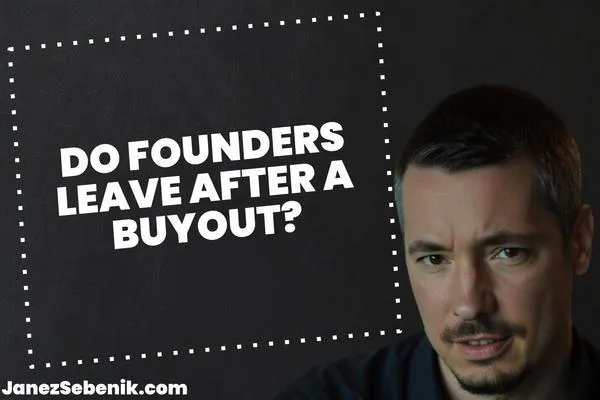
Do founders stay after acquisition?
When a startup gets bought, what happens to the founders? It's a question that keeps many entrepreneurs up at night. After all, you've poured your heart and soul into your company. You've nurtured it from an idea to a thriving business.
So when a big fish comes along and gobbles up your startup, do you stick around or swim away? The truth is, there's no one-size-fits-all answer - it depends on the deal, the founders, and the acquiring company.
Some founders stay on, taking new roles in the merged company. Others cash out and move on to their next big idea. And some find themselves somewhere in between, sticking around for a transition period before heading off into the sunset.
Key Takeaways
Founder outcomes after acquisition vary widely, from leaving to staying in the same role
The decision to stay or go depends on personal goals, deal terms, and the new company culture
Post-acquisition performance of founder-led firms can impact the length of a founder's stay
The Acquisition Game
The acquisition game is like poker. You need to know the rules, read your opponents, and play your cards right. It's high stakes, with your company's future on the line.
Understanding M&A
M&A stands for mergers and acquisitions. It's when one company buys another. You, as a founder, are on the selling side.
Big companies often buy startups to grow faster. They want your tech, your team, or your market share. Sometimes all three.
Venture capitalists play a big role too. They've invested in you and want a return. Their goals might not always match yours.
The competitive landscape matters. If you're crushing it, you'll have more leverage. If you're struggling, buyers might lowball you.
Evaluating the Offer
When an offer comes in, don't jump at it. Take a step back. Breathe.
Look at the numbers. Is it cash? Stock? A mix? Each has pros and cons.
Think about your team. Will they keep their jobs? Will they be happy?
Consider your product. Will the buyer kill it? Grow it? Change it completely?
Negotiation is key. Don't take the first offer. Push back. Ask for more. But don't push so hard you lose the deal.
Remember, an IPO might be an option too. Weigh it against acquisition offers.
Founder's Journey Post-Acquisition
You've sold your company. Now what? Your role as a founder is about to change big time. Let's dive into what happens next.
Staying On Board
You might decide to stick around after the acquisition. It's not uncommon. Many founders stay in the CEO position for four to 12 months post-acquisition. Why? To help with the transition, of course.
Your job? Train the new team and announce your successor. It's like passing the torch, but with a lot more paperwork.
You'll need to:
Adjust to new bosses (weird, right?)
Help maintain company culture
Share your insider knowledge
It's a balancing act. You're no longer the big boss, but you're still crucial. Your experience is gold to the new owners.
Transitioning Out
Maybe you're ready to peace out after the sale. That's cool too. Lots of founders are itching to start their next venture or hit the beach.
If you're heading for the exit:
Plan your departure carefully
Help with knowledge transfer
Consider your legacy
You might feel a mix of emotions. Pride, relief, maybe even a bit of sadness. It's normal. You're closing a big chapter in your life.
Remember, there's no one-size-fits-all approach. Some founders stay put, others leave right away. It's your journey. You get to choose the next stop.
Money Talks
Money is a big reason founders stay or go after an acquisition. The deal structure and your equity can make a huge difference. Let's break it down.
Deal Structure and Finances
When a company buys your startup, they might offer you a sweet deal to stick around. Earn-outs are like golden handcuffs. They pay you extra if you hit certain goals.
But here's the catch: you might have to stay for years to get all the cash. Is it worth it? That's up to you.
Some buyers offer a big upfront payday. Others spread it out over time. You've gotta decide what works best for your life and plans.
Remember, taxes can take a big bite. Get a good accountant to help you figure it out.
The Role of Equity
Your equity in the company is like your baby. You've watched it grow from nothing. Now it's worth something big.
When you sell your startup, you might get a mix of cash and stock in the new company. This can be a great way to keep some skin in the game.
But be careful. That new stock might come with strings attached. Vesting schedules can lock you in for years.
On the flip side, if the acquiring company is public, you might be able to cash out faster. Just watch out for any lockup periods.
Think hard about how much of your net worth you want tied up in one company. Diversification isn't just a fancy word - it's smart money management.
The Impact on the Startup Ecosystem
When founders stay or go after acquisition, it shakes up the whole startup world. It changes how people think about building companies and chasing their dreams. Let's dive into the ripple effects.
Cultural Shifts
You've seen it happen. A hot startup gets bought, and boom - everything changes. The founder sticks around, and suddenly, big companies are trying to act like startups. They're all about "innovation" and "disruption" now.
But it goes both ways. Sometimes the startup loses its mojo. The cool, laid-back vibe? Gone. Now it's all suits and quarterly reports.
And here's the kicker: it's not just about one company. This stuff spreads. Silicon Valley starts to look more like Wall Street. Europe tries to catch up. The whole game changes.
Inspiring New Entrepreneurs
You know what's crazy? Every time a founder cashes out, a thousand new dreams are born. It's like a spark that lights up the whole ecosystem.
Young guns see these successful exits and think, "That could be me." They quit their day jobs, max out their credit cards, and dive in headfirst.
Venture capital? It's flowing like crazy. Everyone wants a piece of the next big thing. And it's not just about the money. It's about proving you can build something from nothing.
But here's the real magic: these new founders? They're changing the game. They're solving problems you didn't even know you had. And that, my friend, is how progress happens.
The Next Adventure
So, you've got a fat bank account and an entrepreneurial itch. What's next? Many founders jump right back into the game. They start new companies or become angel investors.
You might join a venture capital firm, helping other startups grow. Or maybe you'll take a left turn and start that llama farm you've always dreamed about.
The world is your oyster. You've got the experience, the connections, and now the cash. Use it wisely. Maybe you'll create the next Twitter. Or maybe you'll find a whole new industry to disrupt.
Remember, success isn't just about money. It's about impact. What mark do you want to leave on the world? That's your next big adventure.

